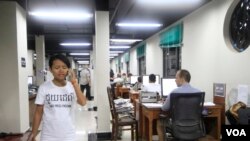Early on Monday, Cambodia Daily staffer Chhorn Chansy’s daughter asked him why he was not going to work. It was the first day that the newspaper had closed its doors after more than 24 years.
The Daily’s forced closure came as a surprise to the public and Daily staff. Chansy, the news editor at the paper, did not see it coming, either.
“I didn’t think that they would close. We had faced many big issues [in the past], including confrontations with lawsuits before, but we always made it through. Even before the closure, I thought that there would be a last-minute solution,” he said.
The Daily was hit with a $6.3 million tax bill for alleged unpaid back taxes, but it claimed the bill was politically motivated and an attempt to silence another critical voice ahead of next year’s elections. The government, its management noted, had not sought to conduct an audit based on the Daily’s financial records.
Chansy worked at the Daily for a decade, turning his hand to almost all jobs at the paper, including stints as a crime and court reporter and various editorial roles.
The Daily was founded in 1993 by an American, Bernard Krisher, a former TIME Magazine journalist, and philanthropist, with the stated aim of strengthening democracy and training up local journalists. When it closed last week, the Daily employed about 50 staff.
Leng Len, 25, was hired in July and started in the role as a reporter eager to cover next year’s election.
“It was like a wheel, running, and then it was stopped immediately so you felt it was going to crash,” she said.
Her last story for the Daily was coverage of the opposition leader, Kem Sokha’s arrest on espionage charges early on Sunday. She slept only two hours that night.
Prime Minister Hun Sen had called the newspaper Cambodia’s “chief thief” for the alleged tax evasion.
The last issue of the Daily ran with a black and white cover containing the names of many of the paper’s staff going back to the early 1990s.
Van Roeun, a veteran journalist at the Daily, said the newspaper’s willingness to devote time and resources to conduct in-depth investigations on crucial issues such as deforestation would be sorely missed.
“That was the birthplace of my professionalism. I’ve learned from foreign journalists who also learned from that place,” he said.
“I am reluctant to move to other places since I see that most media is biased towards the government, not balanced or independent,” he added.
Elizabeth Becker, a veteran journalist who reported on Cambodia in the 1970s, said the Daily’s closure was a big loss for the country.
“It is no exaggeration to say that Daily journalists were courageous in the face of not just physical threats but the hard work they put in for low pay and long hours. It showed their love for Cambodia and the hope everyone still has that the country will recover its fragile democratic underpinning,” she wrote in the email.
“I hope the Cambodian journalists find a way to continue their work for their country - it is critical to any hope of reviving democracy. And I do hope more than a few foreigners stick around and keep the rest of us informed.”
Chansy plans to seek a new job soon to pay for his younger sister’s college fees and keep food on the table.
“The new place has to be similar to my old workplace,” he said.










